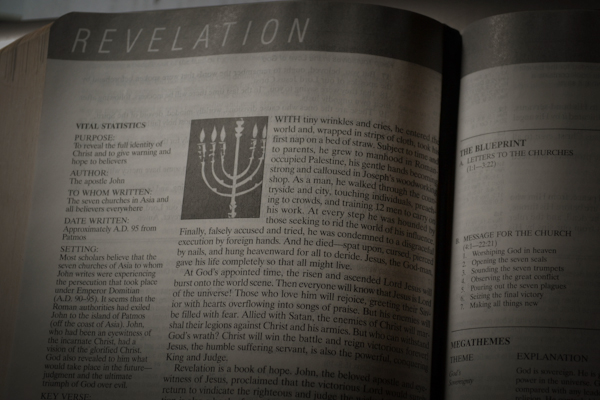Photo by: Will Gentry
The book of Revelation is one of the most debated books, with more controversies surrounding it than any other book in the Bible. Oklahoma Christian University is offering a Book of Revelation class on how to understand some of its challenging concepts.
The Revelation class is a graduate level course. It has two kinds of students in it. Some students are taking it as a Bible elective class in the graduate program, and they are engaged in exegesis, which takes a closer look at how to determine what the author was trying to communicate to his audience.
“It’s a book that is very unfamiliar to us because the author lives in a world that we don’t live in,” John Harrison, professor of the New Testament said. “He lives in a world that he’s comfortable with. He talks about angels, beasts, and demons and knows that there’s a spiritual warfare that is going on. Most Christians don’t really think about a spiritual warfare.
Other students are taking it as a Preaching in Revelation course. A lot of churches do not preach from the book of Revelation.
“I think the book has been ignored because people think that in reading it or preaching it, they must engage in the always-polarizing debate between premillennialism and millennialism,” Philip Brookman, Memorial Road Church of Christ minister, said.
To prepare his students for studying the book of Revelation, Harrison requires them to read similar works.
“I require my students to read other Jewish apocalyptic texts, with the exception of Daniel,” Harrison said. “Students must read 1 Enoch, a popular Jewish work, 2 Baruch, the Apocalypse of Abraham. When you come to Revelation, you begin to come very familiar with this world, with how they talked.”
One of Harrison’s students said that the book of Revelation taken in the context that the author wrote it is interesting.
“The book of Revelation is an apocalyptic scripture,” Jason Harvey, an Oklahoma Christian Bible graduate, said. “It has been neat to learn more about the genre of the literature of Revelation “
In addition to the graduate students taking the course, there are about six area ministers taking the class on how to better preach from the book of Revelation.
“Taking the book out of its original Jewish context creates the controversies,” Brookman said. “However, if we re-examine how the first-century Christians would have understood some of the apocalyptic language, it can help us rediscover what the book means today.”
The graduate class meets for about an hour to talk about exegesis before the area ministers arrive. The class then procedes with discussion chapter by chapter to look at what the author was trying to communicate to his audience and why.
“After the ministers come, we talk about preaching from the text,” Harrison said. “We also move from what the author was trying to communicate to how would we go about preaching such a text in our congregations.”
Some ministers do not like preaching from the book of Revelation because, to some, it is an intimidating book with many obscure symbols and images. Another reason why ministers prefer to preach from other books of the Bible besides Revelation is the issue of moral concepts, which Revelation seems to lack.
“Many preachers also find the book of Revelation challenging to find a moral lesson from most of the book,” Harrison said. “But beside the standard moral of trust God, perseverance, and be faithful, the book of Revelation does not appear to them to have a lot to say to most Christians and how they are living their everyday lives.”
Today, most Christians think about how to be a better spouse, make good choices in life, not be anxious with life’ problems and how to deal with financial problems.
“Some preachers feel the pressure to address people’s daily concerns, weekly concerns or life concerns, and they don’t see Revelation as addressing those as clearly, so they stay away,” Harrison said.
When it comes to the book of Revelation, there are strong feelings and beliefs, which creates adamant feelings and controversies.
“The ministers know if they go through Revelation that there are some very adamant feelings about what this book is telling us, and they don’t want to get into the doctoral controversies that the book has been used for,” Harrison said.
One of the controversies about the book of Revelation is popular beliefs that have been created about it. Some people, for example, believe in the millennium kingdom; others do not. Others, according to Harrison, believe that Revelation sketches the history of the church throughout time.
“People have different views when it comes to the book of Revelation; that is why it would be difficult preaching from the book of Revelation,” Harvey said. “But me personally, I would love to preach from it.”
Harrison hopes that after his students have finished the six-week course of Revelation that their confidence to teach from the book will begin to soar in this day and age.
“I hope that they will certainly have confidence in handling the book of Revelation,” Harrison said. “I hope that they will be inspired to want to teach and preach Revelation. I think that there are people who would like to have a class on Revelation.”
There are many people that find the mysterious book intriguing.
“I think there are people, many Christians, who find the book mysterious, perplexing, puzzling, and would be intrigued to work through it,” Harrison said. “But I hope to inspire my students that it is okay for Revelation to be mysterious and perplexing, but also to reassure them that the book is intentionally mysterious, and all of it does not have to be answered.”












Be First to Comment